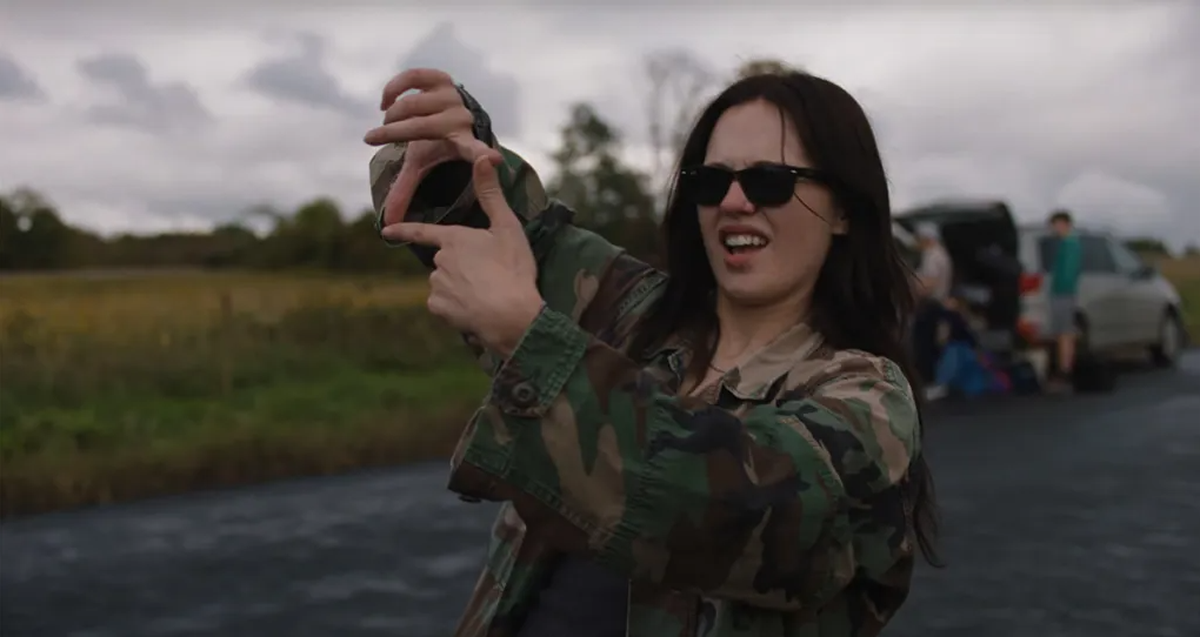A still from ‘My First Film’
| Photo Credit: MUBI
Zia Anger’s My First Film is a paradox — a (second) debut that is not just about making art, but about how making art falls apart. Streaming on MUBI, the film operates as a hybrid of documentary, performance piece, and fiction, tracing Anger’s attempts, over a decade ago, to craft her first feature, Always All Ways, Anne Marie, a project that ultimately collapsed. Yet, rather than dwelling on the ruins, My First Film turns the rubble into something bold and kaleidoscopic — an inquiry into failure, artistic process, and the wild, frenzied road of self-expression.

From the first frame, where we’re greeted by the simple sight of a blinking cursor, Anger subverts expectations, acknowledging that what we’re about to witness transcends tradition, using TextEdit to express her thoughts. We’re drawn into a deeply interactive experience — both as a reflection on her younger self’s missteps and a reckoning with the personal demons that shaped her journey. There’s a rawness to Anger’s voice here, a willingness to let us in on the creative (and personal) meltdowns that punctuated her early efforts. Yet, this isn’t self-indulgence. Her exploration of how fragility and vulnerability are, paradoxically, the backbone of artistic grit feels deliberate.
My First Film (English)
Director: Zia Anger
Cast: Odessa Young, Devon Ross, Cole Doman, Jane Wickline, Seth Steinberg
Runtime: 100 minutes
Storyline: A young filmmaker recounts the story of struggling to make her first feature
Much of My First Film takes place within the contours of memory and self-reflection, as Anger, through her fictionalised stand-in Vita (played by Odessa Young), revisits her experiences on set. Vita is an embodiment of youthful passion — filled with ideas, ambition, and more than a fair share of hubris. Anger juxtaposes Vita’s earnestness with scenes of collapse: a stoned crew that checks out, an actress too green for the part, and a suffocating relationship that derails both personal and professional efforts. The result? A haunting reflection on how youthful ambition can quickly turn into the wreckage of reality.

Odessa Young in a still from ‘My First Film’
| Photo Credit:
MUBI
In many ways, My First Film is as much a psychological autopsy as it is Anger’s cinematic journey. We see Vita wrestle with her lack of authority, the frustrations of being an inexperienced woman director, and the expectations foisted upon her by both her crew and herself. It’s a bracing, often uncomfortable reminder of the way the art world can grind down creators before they have even begun to carve out their place.
What makes Anger’s work particularly intriguing is how she marries personal footage, re-enactments, and reflective voiceover to build a unique pastiche of memories and ideas. The intercutting between scenes of the failed shoot and Anger’s more recent self-examination creates a tension of uncertainty — how does one reconcile the gap between who we were and who we’ve become? And through the narrative, Anger doesn’t so much seek to answer this question as revel in the discomfort of it.

But the most audacious moments of My First Film come in its climax, where Anger pulls out all the stops. An abortion, depicted through mime and set to Perfume Genius’s fractured score, becomes a visual metaphor not only for bodily autonomy but also for the act of artistic creation (and destruction). In this surreal, harrowing moment, Anger breaks with her own narrative to gesture toward something deeper: the pain of abandoning what you once thought was the core of your identity.

A still from ‘My First Film’
| Photo Credit:
MUBI
And yet, despite its heavy themes, My First Film is wickedly funny. Anger knows how to skewer her own younger self with a sharp sense of humour, acknowledging the foolishness of her former idealism while never losing sight of the humanity behind it. The joy of watching her film comes from the realisation that this is less a self-empowerment narrative that satirises the many absurdities of independent filmmaking and more a testament to the messy, unglamorous work of just trying and failing and trying again.

My First Film is ultimately a love letter to failure. The film is for anyone who’s ever chased a dream only to see it disintegrate in their hands. Anger doesn’t just find beauty in the wreckage, rather, she demonstrates how the steaming, dumpster fire is the beauty.
My First Film is currently available to stream on MUBI
Published – September 11, 2024 06:24 pm IST